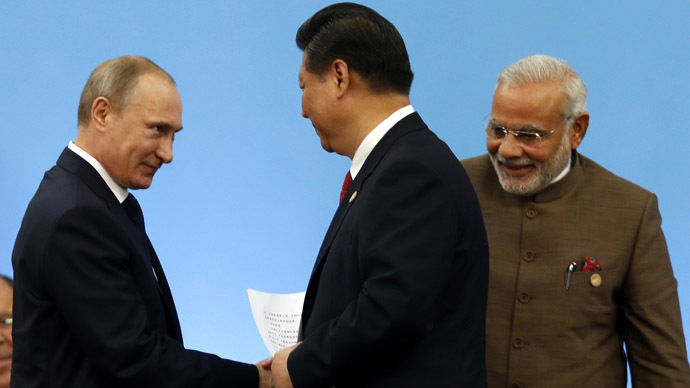Russia, India and China: Cooperating in Unstable World
BRICS, 9 Feb 2015
Dr Alexander Yakovenko – Russia Today

Russia’s President Vladimir Putin (L) shakes hands with China’s President Xi Jinping as India’s Prime Minister Narendra Modi (R) looks on during the VI BRICS Summit in Fortaleza July 15, 2014. (Reuters/Paulo Whitaker)
On February 2 [2015], the foreign ministers of Russia, India and China met in Beijing to discuss a wide range of international and regional issues.
They confirmed that the views of the “troika” on the international situation and ways to promote trilateral cooperation in the existing circumstances are very close if not identical.
The ministers believe the world today is becoming less secure and less predictable. They agreed to support the on-going formation of a polycentric world order that reflects the geographic and civilizational diversity of our world. The current situation makes us believe that a substantial restructuring of the global governance model is underway. Under these circumstances, no single country or isolated group of countries has the resources or capabilities to resolve the various problems of the world short of collective action of all stakeholders concerned.
It is only by reaching consensus amongst the major power centers, involving the broadest possible range of states, and promoting network diplomacy and flexible partnership structures, that a global architecture of comprehensive, equal and indivisible security can be established to combat terrorism and other common threats. It is these principles that underlie the operation of the RIC Troika, united by their endeavor to promote a fair and democratic system of international relations on the basis of the rule of law, equal partnership between states and respect for the principles and goals of the UN Charter.
Russian Minister Sergey Lavrov stressed the RIC format, which gave an impetus to creating BRICS, retains its own added value. This format is supported by all, and will be further expanded both in terms of developing general policy approaches to the pressing issues of our time, and when it comes to enhancing trilateral and practical cooperation in areas of common interest.
_____________________________
Dr Alexander Yakovenko, Russian Ambassador to the UK, Deputy foreign minister (2005-2011).
DISCLAIMER: The statements, views and opinions expressed in pieces republished here are solely those of the authors and do not necessarily represent those of TMS. In accordance with title 17 U.S.C. section 107, this material is distributed without profit to those who have expressed a prior interest in receiving the included information for research and educational purposes. TMS has no affiliation whatsoever with the originator of this article nor is TMS endorsed or sponsored by the originator. “GO TO ORIGINAL” links are provided as a convenience to our readers and allow for verification of authenticity. However, as originating pages are often updated by their originating host sites, the versions posted may not match the versions our readers view when clicking the “GO TO ORIGINAL” links. This site contains copyrighted material the use of which has not always been specifically authorized by the copyright owner. We are making such material available in our efforts to advance understanding of environmental, political, human rights, economic, democracy, scientific, and social justice issues, etc. We believe this constitutes a ‘fair use’ of any such copyrighted material as provided for in section 107 of the US Copyright Law. In accordance with Title 17 U.S.C. Section 107, the material on this site is distributed without profit to those who have expressed a prior interest in receiving the included information for research and educational purposes. For more information go to: http://www.law.cornell.edu/uscode/17/107.shtml. If you wish to use copyrighted material from this site for purposes of your own that go beyond ‘fair use’, you must obtain permission from the copyright owner.